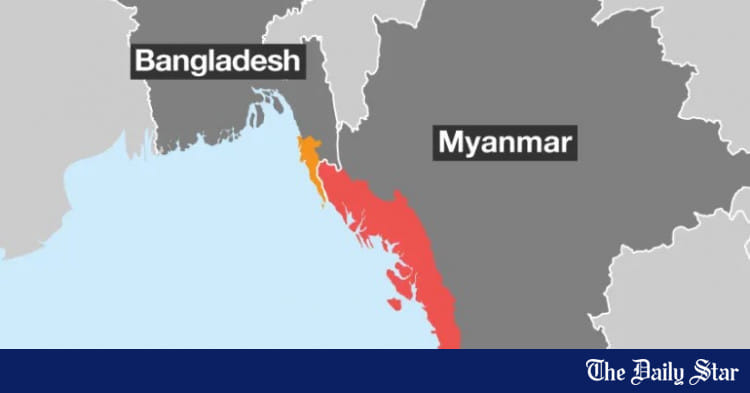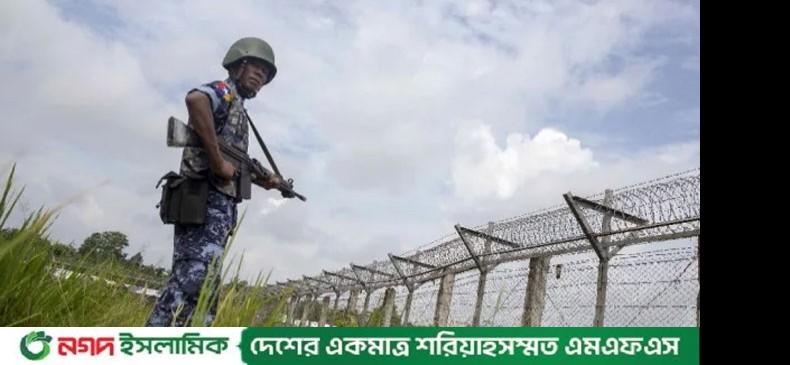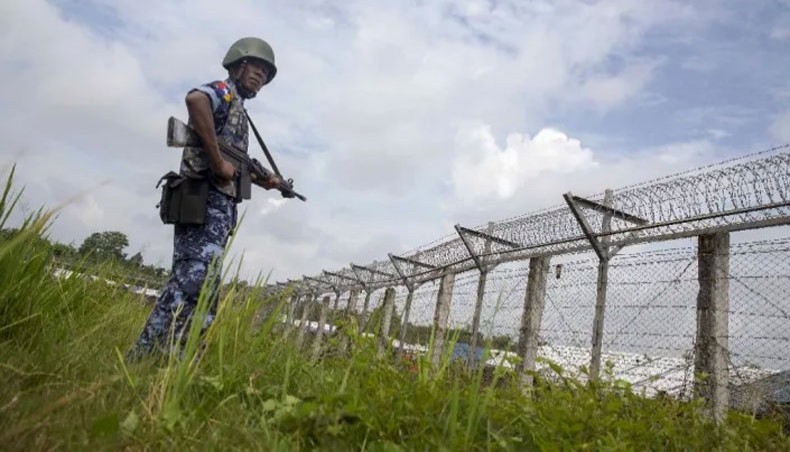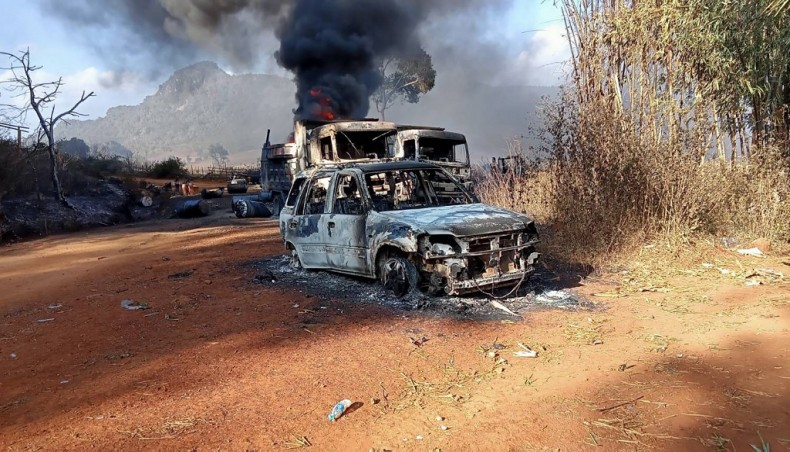Saif
Senior Member
- Joined
- Jan 24, 2024
- Messages
- 16,808
- Likes
- 8,152
- Nation

- Residence

- Axis Group


Rohingyas being forcibly recruited by Myanmar military: report
Community leaders have been pressured to compile lists of at least 50 men for each small village and at least 100 for each IDP camp and large village
Rohingyas being forcibly recruited by Myanmar military: report
Rohingyas offered citizenship cards, $41 monthly salary if they join the military

Photo: Collected
Myanmar's military is forcibly recruiting Rohingya men from villages and camps for internally displaced persons (IDPs) in Rakhine State and it is feared that they will be used as human shields, said a report.
The report comes after the UN special rapporteur on the country said that Myanmar's ruling military junta has "doubled down" on civilian attacks while showing signs of becoming "increasingly desperate" by imposing military service.
Earlier this month, the military said it would enforce a law allowing it to call up all men aged 18-35 and women aged 18-27 to serve for at least two years, as it struggles to quell opposition to its 2021 coup, reports AFP.
"While wounded and increasingly desperate, the Myanmar military junta remains extremely dangerous," the UN's Tom Andrews said in a statement.
"As the junta forces young men and women into the military ranks, it has doubled down on its attacks on civilians using stockpiles of powerful weapons."
Activists and residents of Rakhine, meanwhile, said the military has conducted an initial drive to force Rohingya men in the war-torn state to join their ranks, which saw at least 400 Rohingya men from villages and IDP camps sent to military bases for two weeks of basic training.
"The training period is only two weeks. The junta's military can only use those who have been trained for just two weeks as human shields," Nay San Lwin, co-founder of the Free Rohingya Coalition, told The Irrawaddy, a Myanmar news outlet.
At least 400 Rohingya men have already been forcibly recruited from villages and IDP camps in Sittwe and Buthidaung townships to fight the Arakan Army (AA), residents of the townships and Rohingya activists say.
The recruitment drive follows the first-ever enforcement of Myanmar's conscription law on Feb. 10. Since then, the regime's military has pressured Rohingya community leaders and administrators in villages and IDP camps in three Rakhine townships -- Buthidaung, Maungdaw and Sittwe -- to compile lists of men between 18 and 35 years of age so that they can be conscripted to the military.
Community leaders and administrators have been pressured to compile lists of at least 50 men for each small village and at least 100 for each IDP camp and large village.
"What we were able to confirm on Wednesday (February 21) was that at least 300 people from IDP camps in Sittwe had already been drafted and are now in [military] training grounds," Nay San Lwin said.
Junta troops also arrested at least 100 men from four villages in Buthidaung Township on Feb 18 and 19 and they were sent to a nearby military base for basic military training, he added.
The conscription law only applies to Myanmar citizens. Rohingya people are not recognised as citizens of Myanmar.
Junta forces have told Rohingya men that if they serve in the military, each one will receive a sack of rice, a citizenship identity card and a monthly salary of 150,000 kyats (US$ 41), Rohingya residents of Rakhine State and activists say.
Sittwe, the state capital, has 13 IDP camps for about 100,000 Rohingya people who were displaced by ethnic and religious violence in the western state in 2012. The 300 Rohingya men already forcibly drafted to the junta's military from the IDP camps are just the first group. A list of 300 more, including their names, has already been drafted for the next group, local residents and activists say.
The Irrawaddy was unable to independently verify the numbers.
Rohingya people say they are anxious for those who have already been forcibly drafted as well as for themselves. Sooner or later, it will happen to them or a loved one, they say.
The first 300 Rohingya men forcibly conscripted from IDP camps are receiving "basic military training" inside the base of Artillery Battalion 373 in Sittwe.
The Irrawaddy was unable to independently verify the numbers.
Nay San Lwin is calling for rapid and more effective international action against the junta's atrocities and human rights violations. He called on neighboring countries and Asean to do more.
The junta's military is suffering major defeats in battles with the AA, one of three ethnic armies in the Brotherhood Alliance that spearheaded Operation 1027, which was launched in northern Shan State on Oct. 27 last year.
After humiliating the junta's military in northern Shan State, the AA did the same in Rakhine State.
On Nov. 13, it launched a large-scale offensive against regime targets across northern Rakhine State and in Paletwa Township in neighboring Chin State.
It has seized more than 170 junta bases and outposts since Nov 13, as well as six towns in Rakhine State and one in Chin State.
The junta's military is fighting an army that knows the terrain of Rakhine State better than it does and has public support.
Photo: Collected
Myanmar's military is forcibly recruiting Rohingya men from villages and camps for internally displaced persons (IDPs) in Rakhine State and it is feared that they will be used as human shields, said a report.
The report comes after the UN special rapporteur on the country said that Myanmar's ruling military junta has "doubled down" on civilian attacks while showing signs of becoming "increasingly desperate" by imposing military service.
Earlier this month, the military said it would enforce a law allowing it to call up all men aged 18-35 and women aged 18-27 to serve for at least two years, as it struggles to quell opposition to its 2021 coup, reports AFP.
"While wounded and increasingly desperate, the Myanmar military junta remains extremely dangerous," the UN's Tom Andrews said in a statement.
"As the junta forces young men and women into the military ranks, it has doubled down on its attacks on civilians using stockpiles of powerful weapons."
Activists and residents of Rakhine, meanwhile, said the military has conducted an initial drive to force Rohingya men in the war-torn state to join their ranks, which saw at least 400 Rohingya men from villages and IDP camps sent to military bases for two weeks of basic training.
"The training period is only two weeks. The junta's military can only use those who have been trained for just two weeks as human shields," Nay San Lwin, co-founder of the Free Rohingya Coalition, told The Irrawaddy, a Myanmar news outlet.
At least 400 Rohingya men have already been forcibly recruited from villages and IDP camps in Sittwe and Buthidaung townships to fight the Arakan Army (AA), residents of the townships and Rohingya activists say.
The recruitment drive follows the first-ever enforcement of Myanmar's conscription law on Feb. 10. Since then, the regime's military has pressured Rohingya community leaders and administrators in villages and IDP camps in three Rakhine townships -- Buthidaung, Maungdaw and Sittwe -- to compile lists of men between 18 and 35 years of age so that they can be conscripted to the military.
Community leaders and administrators have been pressured to compile lists of at least 50 men for each small village and at least 100 for each IDP camp and large village.
"What we were able to confirm on Wednesday (February 21) was that at least 300 people from IDP camps in Sittwe had already been drafted and are now in [military] training grounds," Nay San Lwin said.
Junta troops also arrested at least 100 men from four villages in Buthidaung Township on Feb 18 and 19 and they were sent to a nearby military base for basic military training, he added.
The conscription law only applies to Myanmar citizens. Rohingya people are not recognised as citizens of Myanmar.
Junta forces have told Rohingya men that if they serve in the military, each one will receive a sack of rice, a citizenship identity card and a monthly salary of 150,000 kyats (US$ 41), Rohingya residents of Rakhine State and activists say.
Sittwe, the state capital, has 13 IDP camps for about 100,000 Rohingya people who were displaced by ethnic and religious violence in the western state in 2012. The 300 Rohingya men already forcibly drafted to the junta's military from the IDP camps are just the first group. A list of 300 more, including their names, has already been drafted for the next group, local residents and activists say.
The Irrawaddy was unable to independently verify the numbers.
Rohingya people say they are anxious for those who have already been forcibly drafted as well as for themselves. Sooner or later, it will happen to them or a loved one, they say.
The first 300 Rohingya men forcibly conscripted from IDP camps are receiving "basic military training" inside the base of Artillery Battalion 373 in Sittwe.
The Irrawaddy was unable to independently verify the numbers.
Nay San Lwin is calling for rapid and more effective international action against the junta's atrocities and human rights violations. He called on neighboring countries and Asean to do more.
The junta's military is suffering major defeats in battles with the AA, one of three ethnic armies in the Brotherhood Alliance that spearheaded Operation 1027, which was launched in northern Shan State on Oct. 27 last year.
After humiliating the junta's military in northern Shan State, the AA did the same in Rakhine State.
On Nov. 13, it launched a large-scale offensive against regime targets across northern Rakhine State and in Paletwa Township in neighboring Chin State.
It has seized more than 170 junta bases and outposts since Nov 13, as well as six towns in Rakhine State and one in Chin State.
The junta's military is fighting an army that knows the terrain of Rakhine State better than it does and has public support.












